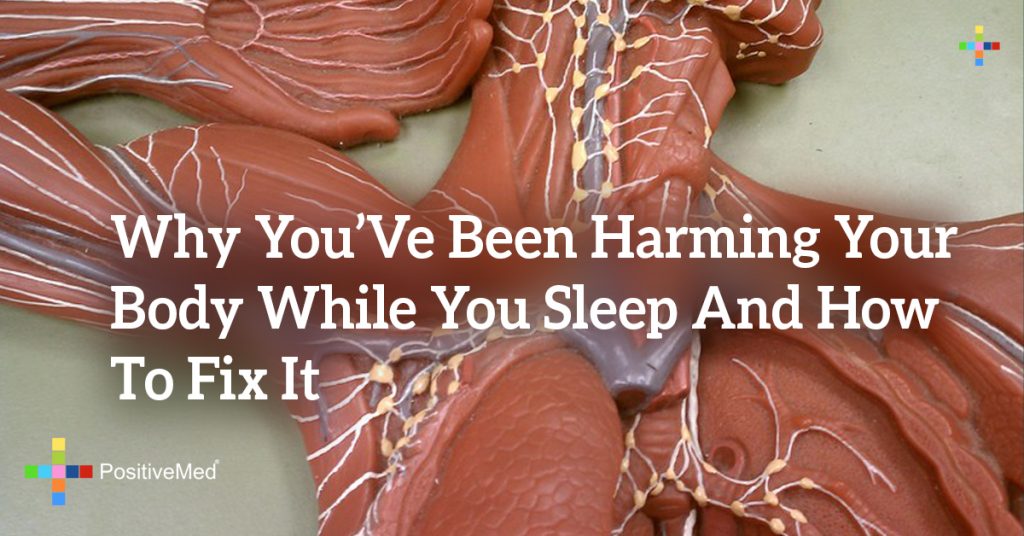
Why You’ve Been Harming Your Body While You Sleep and How to Fix It
[nextpage title=”…”]
Like food and water, our bodies need sleep for several reasons. Not only does tissue repair and relaxation occur, but it also offers our brain the chance to cleanse itself. Studies show that during sleep the brain flushes and repairs itself from the damage done during consciousness. Maintaining the proper body systems is key to taking care of the brain even while sleeping.

The Lymphatic System
The lymphatic system is a crucial component to maintaining a healthy body. It helps remove wastes and toxins in addition to taking white blood cells to important places of the body to reduce infections. The spleen is the main regulator of this system. When it detects dangerous substances in the blood, it and the lymph nodes make lymphocytes that produce antibodies that kill foreign substances and stop the spread of infections.
The lymphatic system is made mostly of lymphatic vessels that act like the veins and capillaries that transport blood in the circulatory system. The lymphatic vessels are connected to lymph nodes where lymph fluid is filtered, and there are hundreds of these nodes in the body. Many are located around vital organs like the lungs and heart while others are located under the arm fold or in the groin. If the lymphatic system isn’t functioning properly, the body doesn’t have the resources it needs to stay healthy and fit. Because of this, moving lymph fluid around the body is very important. Moving it to the brain is important as well but much more difficult by comparison.
RELATED ARTICLE: The Exact Number Of Hours You Need To Sleep According To Your Age
Lymph Fluid and Brain Function
In the past, the scientific world was unaware of another system known as the “glymphatic” system. This system is responsible for removing waste just for the brain and central nervous system. It removes proteins and toxins away from the brain and distributes the amino acids, lipids and glucose that the brain needs to function the right way.
[/nextpage] [nextpage title=”…”]
If the glymphatic system fails to function, it can lead to a variety of cognitive disorders such as Parkinson’s disease, Alzheimer’s, Huntington’s disease, ALS and more. Ensuring this system works properly is essential for maintaining physical and mental health. If it gets backed up or slowed down, it could hamper cognitive abilities or affect mood.
Sleeping and the Glymphatic System
The glymphatic system is only active during sleep, so a proper sleeping position determines how well the system will be able to work. In a study from The Journal of Neuroscience, it was found that the sleeping position of rats determined how well glymphatic fluid was transported through the brain and how much of it went in and out during the process. Those who slept with their heads elevated had the smallest amount of fluid transfer, but those who slept on their sides with no head support had significant transfer of fluid. It can be concluded from such studies that sleeping in this same position with no elevation for the head is the best way to help the glymphatic system flow freely during sleep. To keep the brain healthy, it may be beneficial to eliminate pillows in the bedroom. They can cause neck pain while also making it difficult for fluids to flow into and out of the brain.
The Correct Way to Sleep
The best way to sleep for proper movement of fluids within the body is with a large pillow placed under the hips or with the legs elevated compared to the head. Sleeping sideways on the arm and shoulder is also a much more natural position than the standard placement with the back down and the head on the pillow. Sleeping this way also helps prevent pain, strain and other problems on the neck. Sleeping in an inverted position with the head lower than the legs and feet can be very beneficial to overall health.
Sleeping with the head elevated means the blood and lymph fluid must work harder to be pumped toward the brain, and this uses up adrenaline and noradrenaline. Research has shown that adrenaline and noradrenaline are reduced significantly after one becomes accustomed to sleeping in completely horizontal or inverted positions. At birth, many people are placed in cribs away from the nurturing sleeping pattern of being placed on the mother’s body. As we grow older, we become accustomed to sleeping with pillows, so this can be a difficult habit to break in adulthood.
Even if you can’t sleep without a pillow, try a position that allows your legs to raise above head level. It may be hard to break lifelong sleeping cycles, but the benefits are more than worth it to allow your body to freely remove toxins. Helping blood and lymph fluid to flow the way they should is essential to maintaining optimal health from the head down.
[/nextpage]







